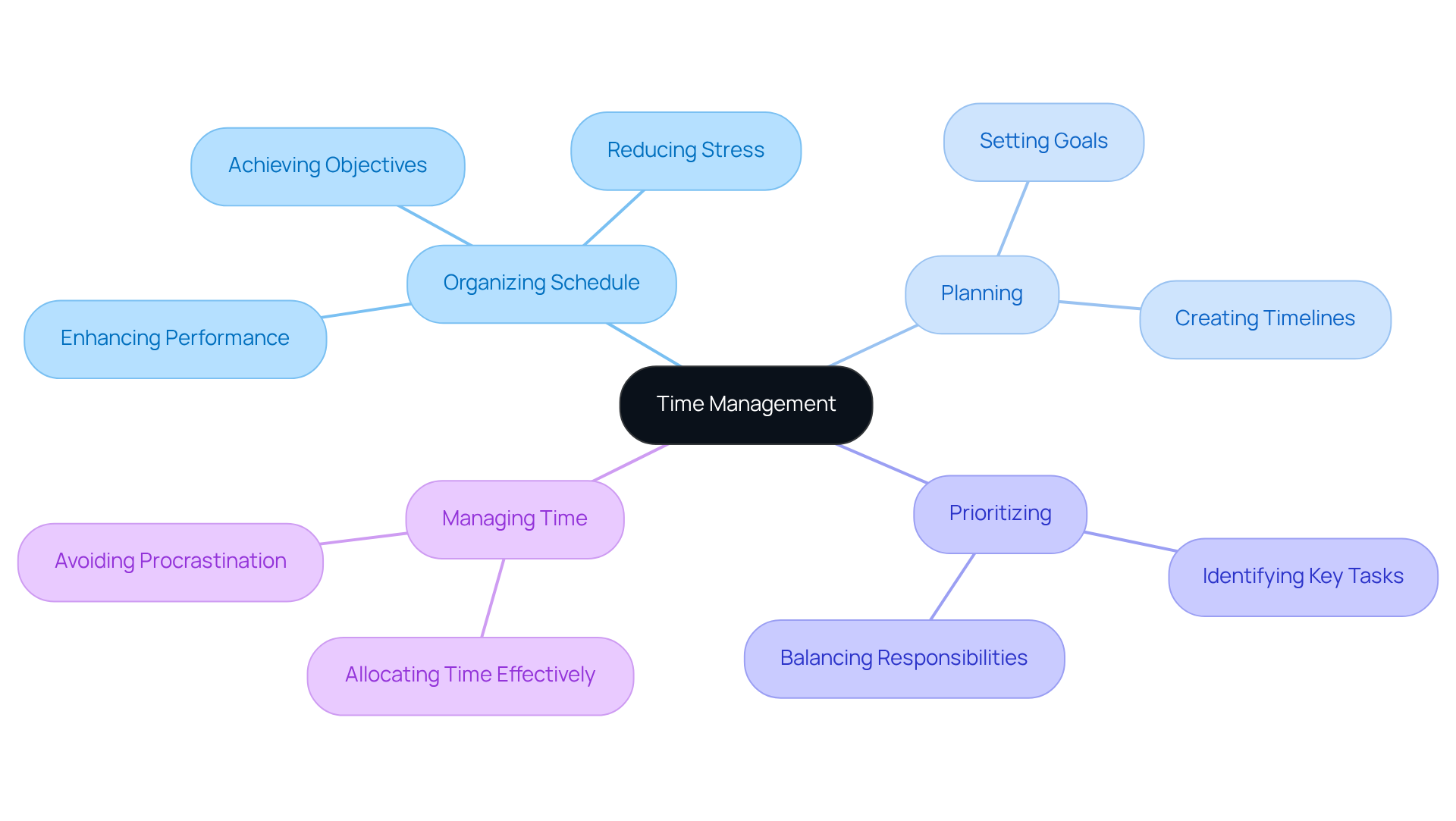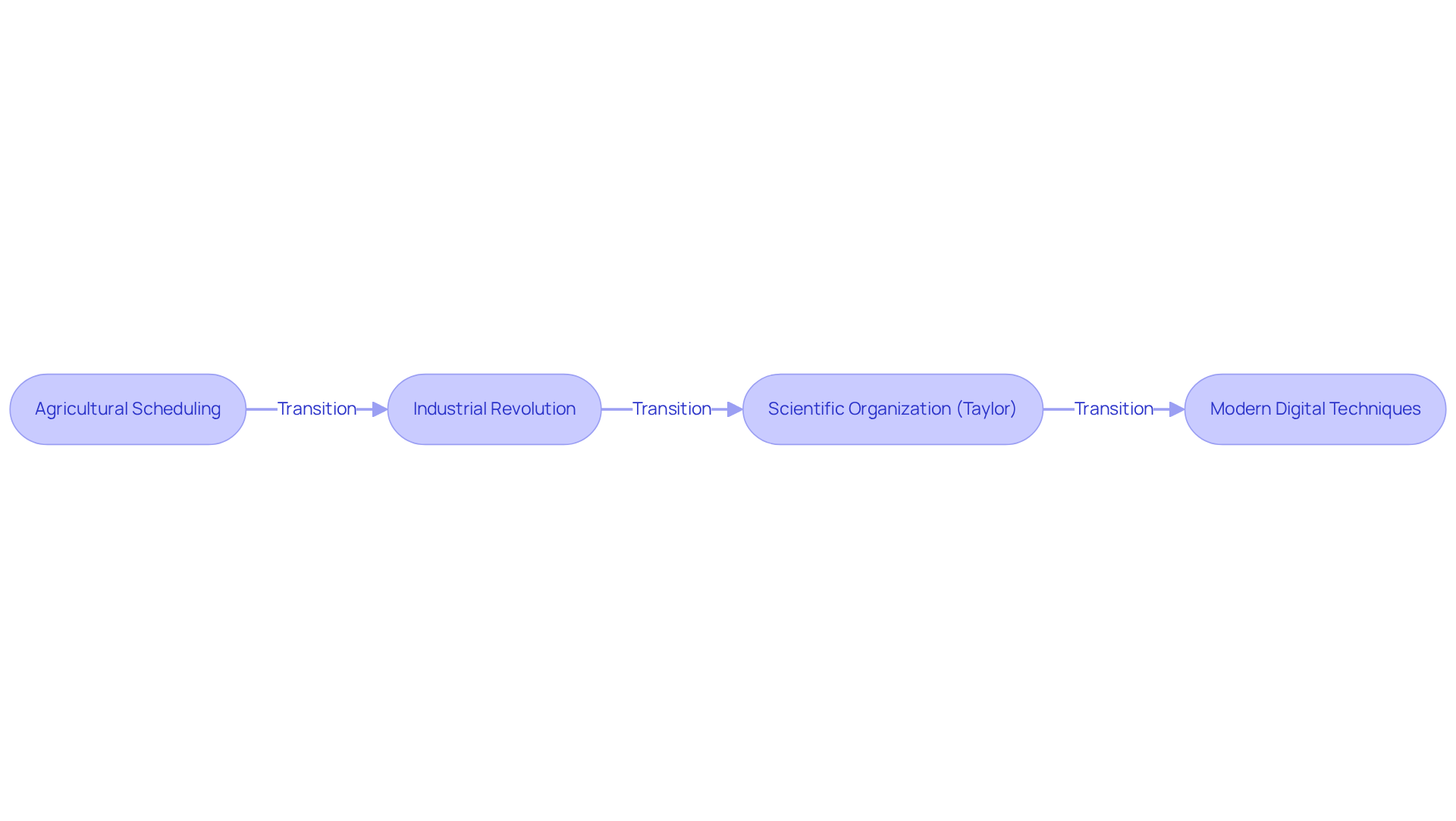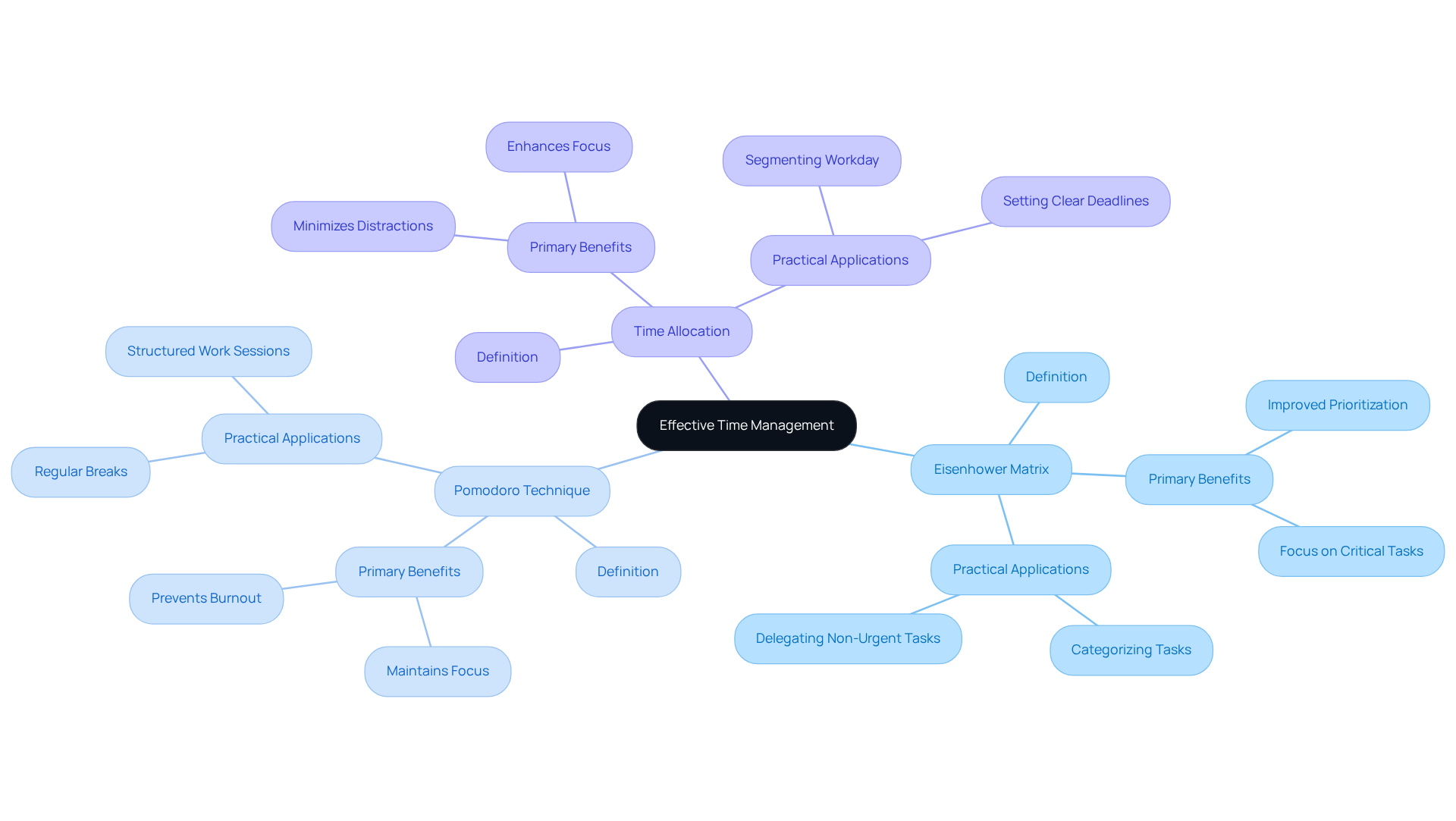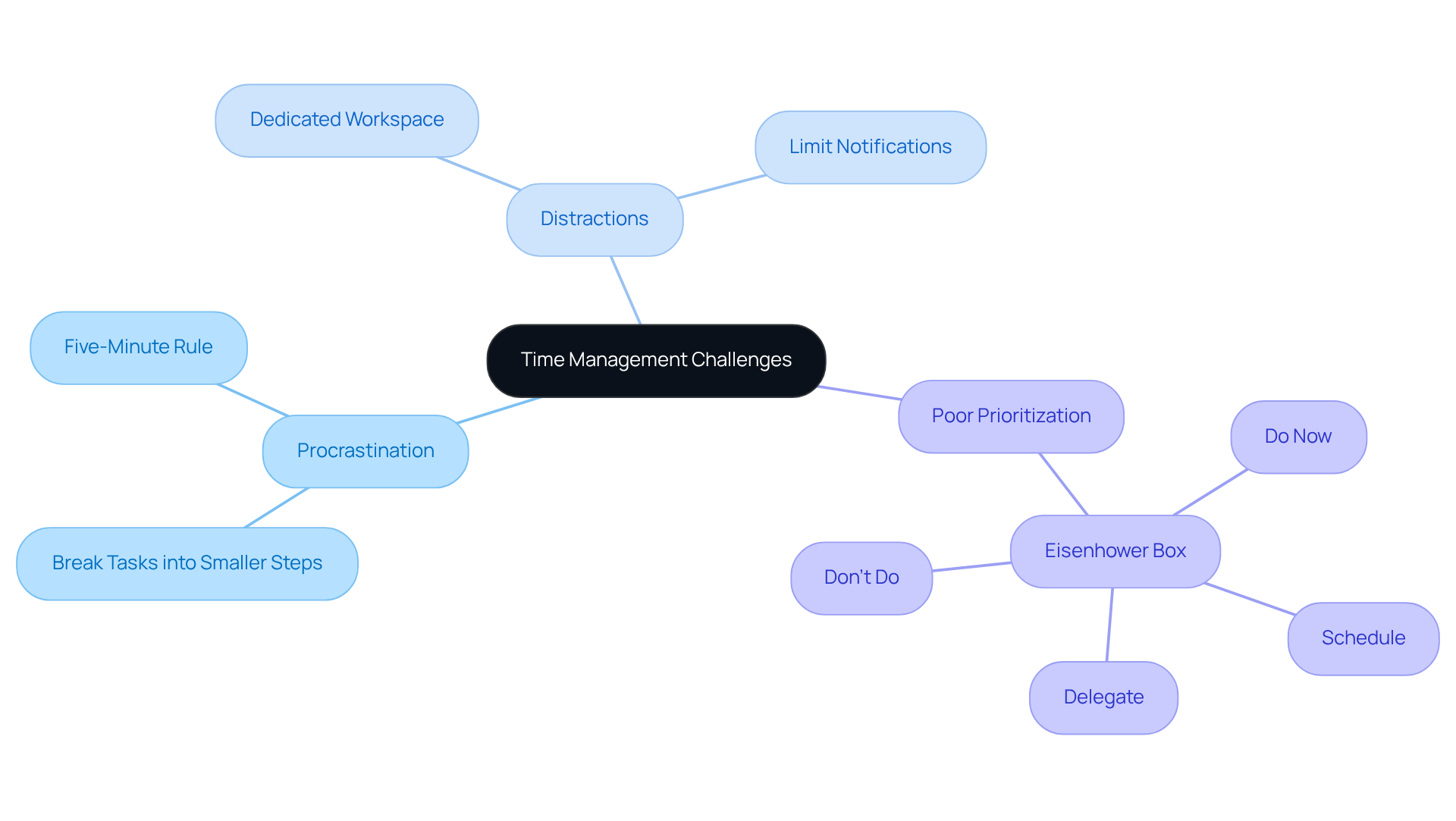Overview
Time management is the essential skill of organizing and planning how to allocate time effectively across various activities. This capability is crucial for achieving goals, reducing stress, and enhancing performance. The article highlights techniques such as:
- The Eisenhower Matrix
- The Pomodoro Technique
These structured approaches can significantly improve productivity and efficiency in both personal and professional contexts.
Introduction
Mastering the art of time management transcends mere calendar management; it is a vital skill that can profoundly influence both personal and professional success. In the face of the complexities of modern life, the ability to organize tasks and prioritize effectively emerges as a crucial factor in enhancing productivity and reducing stress. Yet, despite its significance, many individuals grapple with common pitfalls such as procrastination and distractions.
How can one overcome these challenges and harness the true potential of time management to achieve a more balanced and fulfilling life? The answer lies in understanding and applying effective strategies that empower you to take control of your time.
Define Time Management and Its Significance
Organizing one's schedule is a critical skill that involves meticulous planning and conscious control over the time allocated to various activities. This process requires not only arranging tasks but also establishing priorities and effectively managing time, which raises the question of what is time management to boost productivity and efficiency.
Why is mastering scheduling so crucial? It empowers individuals and groups to achieve their objectives, reduce stress, and enhance overall performance. By effectively organizing hours, you can ensure that important tasks are completed on time, leading to a more balanced and fulfilling life.
Are you ready to take control of your schedule and transform your productivity?

Trace the Evolution of Time Management Practices
The evolution of scheduling techniques has undergone remarkable transformations throughout the centuries. Initially, scheduling was deeply intertwined with agricultural cycles and natural rhythms, with tasks dictated by seasonal variations and daylight hours. However, the industrial revolution marked a pivotal shift, as the demand for workplace efficiency drove the progression of organized scheduling practices. Visionaries like Frederick Winslow Taylor introduced principles of scientific organization in the early 20th century, focusing on productivity enhancement through systematic approaches. This era underscored the importance of evaluating work processes and optimizing output, laying the groundwork for modern productivity techniques.
As time progressed, scheduling practices expanded to incorporate a variety of methodologies and tools. The advent of digital technologies has significantly reshaped how individuals and organizations manage their schedules. Today, techniques such as the Eisenhower Matrix and Agile practices are widely embraced, reflecting the fast-paced dynamics of contemporary work environments. These methodologies prioritize efficient task organization and decision-making, enabling teams to focus on what truly matters. The continuous evolution of scheduling adapts to the complexities of modern life, illustrating what is time management as essential for achieving balance and efficiency in both personal and professional goals.

Explore Key Techniques for Effective Time Management
Effective scheduling is crucial for enhancing productivity, especially for startup founders who juggle numerous responsibilities. Consider these key techniques that can significantly improve time management effectiveness:
-
Eisenhower Matrix: This method categorizes tasks into four quadrants based on urgency and importance, allowing individuals to prioritize effectively. By focusing on activities that are both urgent and significant, startup founders can address critical issues while strategically planning for less pressing responsibilities. Practical applications of the Eisenhower Matrix have shown that users can enhance their decision-making and efficiency by removing or delegating tasks that do not require immediate attention.
-
Pomodoro Technique: This technique promotes concentrated work sessions of 25 minutes, followed by a 5-minute break. Such a structured approach helps maintain focus and prevents burnout, making it especially beneficial for those in high-pressure environments. Research indicates that employing the Pomodoro Technique can lead to a notable boost in productivity, as it encourages regular breaks that refresh the mind.
-
Time Allocation: This strategy involves segmenting the workday into designated intervals dedicated to various activities. By setting clear deadlines for tasks, founders can minimize distractions and ensure that each activity receives the attention it deserves. Time blocking not only enhances focus but also allows for flexibility in adjusting schedules as unexpected issues arise.
Integrating these techniques into daily practices can lead to improved scheduling, which helps startup founders grasp what is time management, prioritize effectively, and enhance overall productivity.

Identify Challenges in Time Management and Solutions
Effective time management can be significantly hindered by challenges such as procrastination, distractions, and poor prioritization. Procrastination can be effectively tackled by dividing activities into smaller, manageable steps and establishing clear deadlines, which fosters a sense of urgency. Consider the 'Five-Minute Rule': it motivates individuals to commit to working on an activity for just five minutes. This simple tactic often leads to sustained involvement beyond that initial pledge, helping to overcome the initial reluctance to begin.
Distractions, particularly from technology and the work environment, can significantly impact efficiency. Statistics show that 50% of employees are regularly distracted by their smartphones, resulting in an average loss of 720 hours per year per employee due to interruptions. To combat this issue, creating a dedicated workspace and utilizing tools that limit distractions—such as disabling non-business-related notifications—can enhance focus and productivity.
Furthermore, prioritization techniques, such as the Eisenhower Box, categorize tasks into four distinct categories:
- do now
- schedule
- delegate
- don't do
This method empowers individuals to concentrate on high-impact activities. By recognizing these challenges and implementing targeted solutions, startup founders can significantly improve their time management skills and boost overall productivity. Are you ready to take control of your time management and enhance your effectiveness?

Conclusion
Mastering time management transcends mere calendar keeping; it is a transformative skill that profoundly impacts personal and professional realms. By understanding and implementing effective time management techniques, individuals can seize control of their schedules, prioritize tasks, and ultimately enhance productivity and well-being.
This article explores the evolution of time management practices, spotlighting key techniques such as the Eisenhower Matrix and the Pomodoro Technique. These methods empower individuals to prioritize effectively and maintain focus. Additionally, it addresses common challenges like procrastination and distractions, offering practical solutions to navigate these obstacles. By integrating these strategies, anyone can enhance their efficiency and achieve a more balanced life.
In a world rife with distractions and competing demands, the importance of effective time management cannot be overstated. It is not merely a skill but a pathway to success, allowing individuals to align their actions with their goals. Embracing these techniques and overcoming challenges will lead to greater productivity and fulfillment. Taking the first step toward mastering time management can transform not only daily routines but also the overall quality of life.
Frequently Asked Questions
What is time management?
Time management is the process of organizing one's schedule through meticulous planning and conscious control over the time allocated to various activities, which includes arranging tasks and establishing priorities.
Why is time management significant?
Mastering time management is crucial as it empowers individuals and groups to achieve their objectives, reduce stress, and enhance overall performance.
How does effective time management impact productivity?
By effectively organizing hours, individuals can ensure that important tasks are completed on time, leading to increased productivity and a more balanced and fulfilling life.




